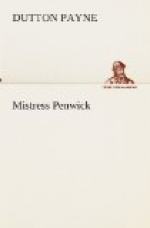“’Tis true.—But what thinkest thou could detain the chest? Father Pomphrey cannot be kept waiting for a christening robe. And to think of Lady Ann being baptized in a common frock! ’Twould make Bettie St. Mar laugh; she already feels quite jealous because we are the first to have Father Pomphrey. And methinks, Janet, now that she is in expectancy—she will so vibrate ’twixt France and England,—fearing she will not be near Father Pomphrey for the christening—that little Julian and Francois will forget which is home.”
“She need not do that; he could go to France.”
“Nay, not so; for he leaves at once for Rome and will not return to England ere summer, meaning not to stop at all in France.”
“Ah! that makes me think of what I heard him say to Monsieur St. Mar in the nursery. ’Twas something about a christening. Monsieur said: ‘Thou art expected at Crandlemar Castle?’ and Father Pomphrey answered: ‘Aye, sometime before next Michaelmas.’”
“Then Lady Bettie will remain in England mayhap.”
“’Tis possible.”
“What did he say of the children, Janet?”
“Of my lord Duke’s and thine?”
“Aye.”
“He said not a word of them in particular, but fondled all alike, calling each by name, and now I think on’t, I wonder he could remember a dozen or so, when he has not yet been three days in the castle. ’Twas ‘Lady Mary’ and ‘Sir Jasper’ and ‘Lady Jane’ and ‘Lady Kate’ and ‘Lord Ivor’; and for each he had a story. And Monsieur grew tired, and my lord Duke asked Sir Julian if the children did not tire him also, and he answered: ’Duke, there is a peculiarly wholesome knowledge that we cannot obtain save through a child’s mind; and while in the companionship of children, we are surrounded by a field of flowers, whose glory fructifies the good germ within us, and Wisdom—that tallest flower, that knows no harvest—springs up at prime, blossoms forth at compline and grows a fragrant staff, upon which man leans in the night of life.’ Then they walked away, and I heard no more.”
“Dear Father Pomphrey—” Then for a moment the Duchess looked with a far-away expression out upon the snow-covered landscape, then, on a sudden, she said, almost pettishly,—“But, Janet, what keeps the chest?”
“Perhaps ’tis Providence.”
“What dost mean; how Providence?”
“Thou hast ordered the robe to be so perfect, so in accordance with the Royal mode, the child will be in torment. Indeed, I am afraid ’twill make the little lady ill to be so encased. Ah! but thou art great folk, and, as Dent hath said, such people ’spend their time in tricking and trimming, pricking and pinning, pranking and pouncing, girding and lacing and braving up themselves in most exquisite manner;—these doubled and redoubled ruffles, these strouting fardingales, long locks and fore tufts;—it was never a good world since starching and steeling, buskes and whalebones, supporters and rebatoes, full moons and hobbyhorses came into use.’ I doubt not that Father Pomphrey himself will demur at such cruelty.”




